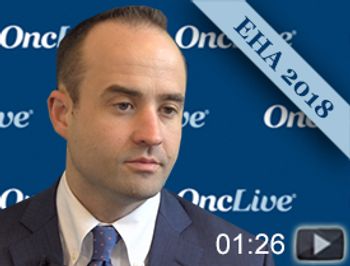
David Sallman, MD, assistant member, Moffitt Cancer Center, discusses the combination of APR-246 and azacitidine as a treatment for patients with TP53-mutant myelodysplastic syndrome and acute myeloid leukemia.

Your AI-Trained Oncology Knowledge Connection!


David Sallman, MD, assistant member, Moffitt Cancer Center, discusses the combination of APR-246 and azacitidine as a treatment for patients with TP53-mutant myelodysplastic syndrome and acute myeloid leukemia.
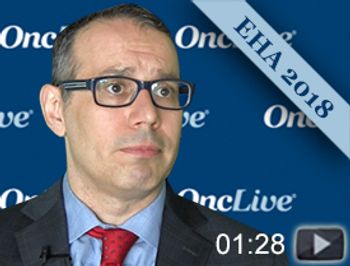
Anthony R. Mato, MD, hematologic oncologist, director, CLL Program, Memorial Sloan Kettering Cancer Center, discusses the safety and efficacy of umbralisib in patients with chronic lymphocytic leukemia.

The addition of elotuzumab to pomalidomide and dexamethasone cut the risk of disease progression or death by 46% compared with pomalidomide and dexamethasone alone for patients with relapsed/refractory multiple myeloma.

The combination of duvelisib and fludarabine-cyclophosphamide-rituximab demonstrated efficacy as a frontline treatment for younger patients with chronic lymphocytic leukemia.
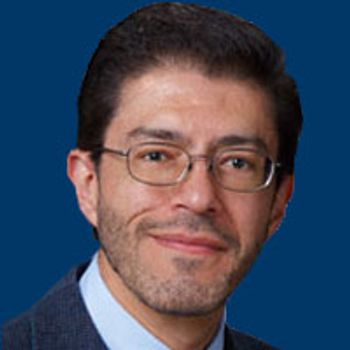
Quizartinib reduced the risk of death by 24% compared with salvage chemotherapy in patients with FLT3-ITD–positive relapsed/refractory acute myeloid leukemia after first-line treatment with or without hematopoietic stem cell transplantation.

The addition of polatuzumab vedotin to bendamustine and rituximab induced a higher rate of complete responses by PET scan compared with BR alone in patients with relapsed/refractory diffuse large B-cell lymphoma.
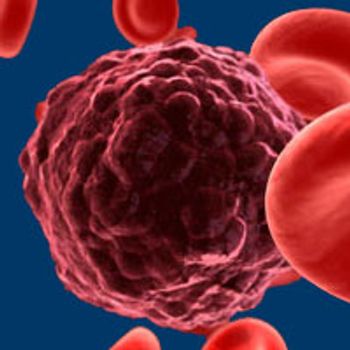
A CAR T-cell therapy specific for CD22 was safe and provided high response rates for pediatric patients with B-cell acute lymphoblastic leukemia who had failed chemotherapy and/or a CD19-targeted CAR T-cell treatment.
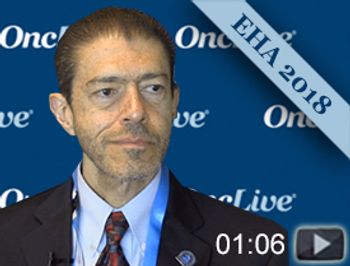
Jorge E. Cortes, MD, professor and deputy chair, Department of Leukemia, The University of Texas MD Anderson Cancer Center, discusses the results of quizartinib in patients with relapsed/refractory acute myeloid leukemia.
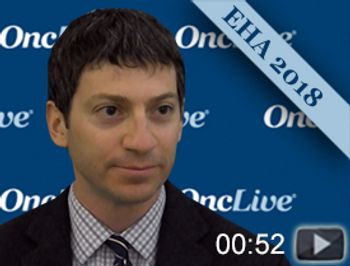
Matthew Davids, MD, MMSc, associate director, Center for Chronic Lymphocytic Leukemia, Dana-Farber Cancer Institute, discusses duvelisib plus fludarabine-cyclophosphamide-rituximab (FCR) as a frontline therapy for the treatment of younger patients with chronic lymphocytic leukemia.

A compound CLL1/CD33-targeted CAR T-cell therapy showed a complete remission with minimal residual disease (MRD) negativity in a single-patient case study from an ongoing phase I study for relapsed/refractory acute myeloid leukemia.
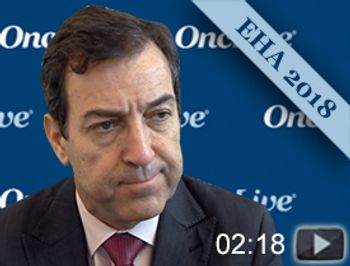
Ramon Garcia-Sanz, MD, PhD, clinician, department of Hematology, Hospital Universitario de Salamanca, discusses the results of brentuximab vedotin (Adcetris) plus ESHAP followed by autologous stem cell transplant in patients with relapsed/refractory Hodgkin lymphoma.
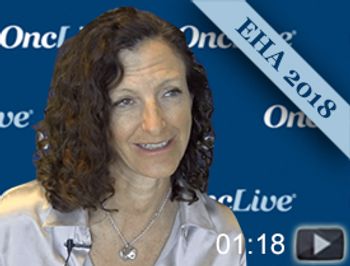
Susan E. Prockop, MD, pediatric oncologist, Memorial Sloan Kettering Cancer Center, discusses tabelecleucel in patients with Epstein-Barr virus (EBV)-associated post-transplant lymphomas.

PET can be safely used to guide treatment in patients with untreated advanced-stage classical Hodgkin lymphoma after 2 cycles of upfront de-escalated BEACOPP.

The combination of obinutuzumab and chlorambucil reduced the risk of death by 24% versus rituximab plus chlorambucil in treatment-naïve patients with chronic lymphocytic leukemia with comorbidities.

The combination of atezolizumab, bevacizumab, carboplatin, and paclitaxel educed the risk of death by 22% compared with bevacizumab and chemotherapy in patients with advanced wild-type non-squamous non–small cell lung cancer.
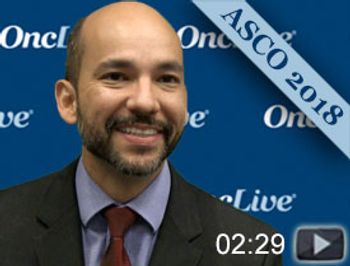
Gilberto Lopes, MD, a medical oncologist at the Sylvester Comprehensive Cancer Center, University of Miami Health System, discusses findings from the KEYNOTE-042 trial of frontline pembrolizumab (Keytruda) as a treatment for patients with squamous and nonsquamous non–small cell lung cancer in an interview with OncLive during the 2018 ASCO Annual Meeting.
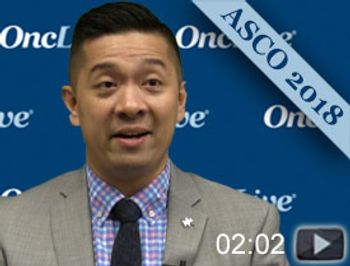
Alexander Drilon, MD, medical oncologist, clinical director, Early Drug Development Service, Memorial Sloan Kettering Cancer Center, discusses findings from the phase I LIBRETTO-001 study exploring the highly selective RET inhibitor LOXO-292 in patients with RET-altered solid tumors.

A combination of 2 over-the-counter medicines can moderately reduce the risk for high-grade dysplasia or esophageal cancer in patients with Barrett’s esophagus if taken for at least 7 years.

Combining the CD122-biased cytokine NKTR-214 with the PD-1 inhibitor nivolumab (Opdivo) showed promising antitumor activity, particularly in PD-L1–negative patients.

A 4-drug chemotherapy combination dramatically improved survival compared with standard gemcitabine as postoperative therapy for patients with resected pancreatic cancer.

The PD-1 inhibitor cemiplimab induced an overall response rate of 47.5% in patients with metastatic cutaneous squamous cell carcinoma.

Preoperative treatment with chemotherapy and radiation improved overall survival rates for patients with resectable or borderline resectable pancreatic cancer compared with immediate surgery.

The addition of heated chemotherapy delivered to the abdomen during surgery delivered no survival benefit to patients with peritoneal carcinomatosis.

Lisocabtagene maraleucel (JCAR017; liso-cel) demonstrated a durable complete remission rate of 46% at 6 months for patients with high-risk diffuse large B-cell lymphoma.

Moxetumomab pasudotox, a first-in-class recombinant immunotoxin targeting CD22, produced deep and durable responses in a substantial proportion of pretreated patients with relapsed/refractory hairy cell leukemia.

Robert M. Jotte, MD, PhD, medical director and co-chair, USON Thoracic Committee, Rocky Mountain Cancer Centers, discusses the phase III findings of the IMpower131 trial, which looked at the addition of atezolizumab (Tecentriq) to frontline carboplatin and nab-paclitaxel (Abraxane) in patients with advanced squamous non

Similar efficacy with the combination of rituximab and lenalidomide coupled with a better safety profile compared with rituximab plus chemotherapy may make the chemo-free regimen a new frontline option for patients with previously untreated follicular lymphoma.
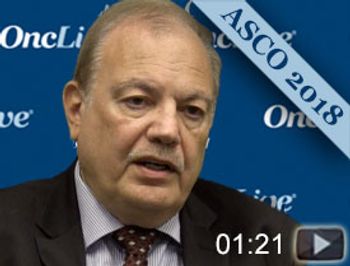
Dennis J. Slamon, MD, PhD, director, Clinical/Translational Research, Revlon/University of California, Los Angeles (UCLA) Women's Cancer Research Program, Jonsson Comprehensive Cancer Center, UCLA, discusses findings of the phase III MONALEESA-3 trial evaluating ribociclib (Kisqali) plus fulvestrant (Faslodex) in postmenopausal women with hormone receptor (HR)-positive, HER2-negative advanced breast cancer.

Half of a small group of patients with relapsed or refractory non-Hodgkin’s lymphoma (NHL) had major responses to treatment with an anti-CD47 antibody plus rituximab (Rituxan).

Combining pegilodecakin with nivolumab or pembrolizumab induced an overall response rate of 41% in patients with advanced non–small cell lung cancer.